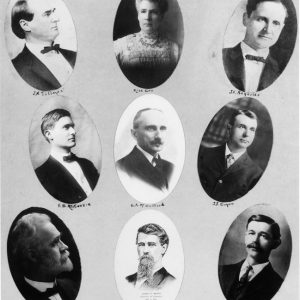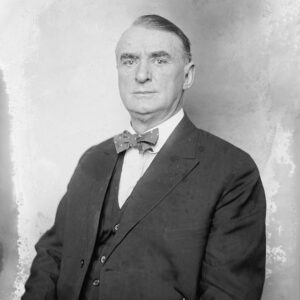calsfoundation@cals.org
John Newton Tillman (1859–1929)
John Newton Tillman was a Democratic member of the U.S. House of Representatives. He represented the Third District of Arkansas in the Sixty-Fourth through the Seventieth Congresses, serving from 1915 to 1929.
John N. Tillman was born near Springfield, Missouri, on December 13, 1859, to Newton J. Tillman and Mary Mullins Tillman. The family moved to Arkansas when he was a child, and he attended the local common schools before graduating from the University of Arkansas (UA) in Fayetteville (Washington County) in 1880. Following graduation, Tillman taught school while also studying law. He read law in the office of Judge J. M. Pittman until Pittman was elected circuit court judge, at which point Tillman studied with local lawyers Holsinger and Hall. In 1882, he was appointed county examiner of the schools in Washington County. Tillman was admitted to the bar in 1883, and he began a private law practice in Fayetteville. He served as the clerk of the circuit court of Washington County from 1884 to 1889.
Tillman married Temple Walker in 1885, and they had three children,
Tillman soon entered the political arena and was immediately successful, winning election to the Arkansas Senate, where he served from 1888 to 1892. As a state senator, he was best known for his sponsorship of the Separate Coach Law of 1891, also known as the Tillman Act, legislation that called for railroads to maintain “equal but separate and sufficient” passenger trains and waiting rooms throughout the state. While the enforced racial segregation mandated by the law was already recognized at the time of the law’s passage, Tillman defended the law as one that would help to reduce existing racial tensions. He then served as prosecuting attorney of the fourth judicial circuit from 1892 to 1898. He was judge of the state’s fourth judicial circuit from 1900 to 1905, before becoming president of UA, a position he held from 1905 to 1912.
A loyal alumnus, he had served as president of the university’s alumni association and was active in the efforts to repeal state laws that had limited development of the state’s higher education system. Tillman also had served on the board of trustees. As president, he was instrumental in the creation of the College of Agriculture, helped raise entrance standards, and presided over a major increase in enrollment. In addition, he successfully fought an effort to relocate the university to Little Rock (Pulaski County). However, his tenure ended in controversy centered upon the expulsion of thirty-six students involved in the underground X-Ray newspaper, which criticized a number of university and local conditions; many of these students hailed from prominent families, and their expulsion led to wider student protests, forcing Governor George Donaghey to step in to resolve the situation. Tillman resigned at the end of the school year in 1912.
Tillman returned to the electoral arena, and in 1914, running as a Democrat, he won election to a seat in the U.S. House of Representatives. He won reelection in six subsequent elections, only once receiving less than sixty percent of the vote and on multiple occasions running unopposed. Early in his congressional career, Tillman had been an outspoken advocate for Prohibition, giving a rousing speech in the House in support of the Eighteenth Amendment in December 1917. In 1924, when he was running for reelection, he proclaimed himself a proud member of the Ku Klux Klan (KKK). While in Congress, he served on Judiciary Committee as well as Committee on Indian Affairs and the Committee on Public Lands. In 1926, he was one of the members chosen to conduct the impeachment of District Court judge George W. English, who resigned from the bench before facing a Senate trial.
Near the end of his term, he gained some national attention with the introduction of legislation that would allow for a national board of magazine and book censorship. His action was motivated at least in part by the publication of a book, The President’s Daughter, by Nan Britton, who claimed she had been the mistress of President Warren Harding. Tillman attacked the book but refused to accept Britton’s offer of financial reward if Tillman could disprove her story.
After seven terms in the House, and in declining health, Tillman did not seek reelection in 1928. Returning home to Arkansas, Tillman died in Fayetteville on March 9, 1929, only days after the end of his congressional service. He is interred in Evergreen Cemetery in Fayetteville.
For additional information:
Graves, John William. “The Arkansas Separate Coach Law of 1891.” Arkansas Historical Quarterly 32 (Summer 1973): 148–165.
“John Newton Tillman.” Biographical Directory of the United States Congress. http://bioguide.congress.gov/scripts/biodisplay.pl?index=T000276 (accessed September 16, 2021).
“John Newton Tillman: 1905–1912.” University of Arkansas. https://chancellor.uark.edu/about/presidents-chancellors/john-n-tillman.php (accessed September 16, 2021).
Niswonger, Richard L. Arkansas Democratic Politics, 1896–1920. Fayetteville: University of Arkansas Press, 1990.
Williams, C. Fred, S. Charles Bolton, and LeRoy T. Williams, eds. Documentary History of Arkansas. 2nd ed. Fayetteville: University of Arkansas Press, 2013.
William H. Pruden III
Ravenscroft School
 Early Twentieth Century, 1901 through 1940
Early Twentieth Century, 1901 through 1940 Arkansas State Archives
Arkansas State Archives  John N. Tillman
John N. Tillman 




Comments
No comments on this entry yet.